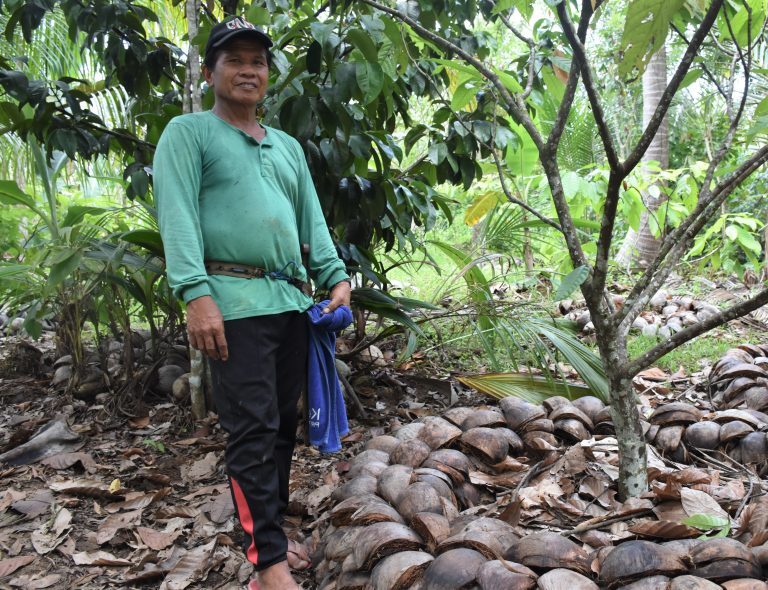SUMMARY
This is AI generated summarization, which may have errors. For context, always refer to the full article.

This is a feature from the Peace and Equity Foundation.
DAVAO DEL NORTE, Philippines – Seated beneath a tall coconut tree and away from the scorching heat of the sun, Narciso Lara chopped coconut husks that he would use to surround other coconut trees in a practice called mulching meant to keep the soil healthy.
“Ginagawa namin ito para lumamig ang puno (We do this to keep the tree cool),” he said.
Lara, whose main source of income is coconut farming, said that he was hopeful for an increase in productivity of his trees through good agricultural practices such as mulching, adding that it would help support the education of his children.
“Mayroon din akong cacao at saging. [Mabuti na lang] at may mga buyers dito (We also have cacao and bananas. It’s a good thing there are buyers here),” he said.
Lara is one of 10 farmers chosen to be part of the demo farm project of the Peace and Equity Foundation (PEF) – with partners Cocolink and Laak Multipurpose Cooperative (LAMPCO) – to link enablers across the value chain of San Isidro, Davao del Norte.
Model farms of San Isidro
San Isidro, a fourth-class municipality with a population of 27,000, consists mainly of coconut and cacao farmers. According to the Philippine Statistics Authority, the town has a 43% poverty incidence in 2015, way above the 14.5% poverty incidence of the entire province.
Recognizing this problem, PEF, Cocolink, and LAMPCO, along with the local government, inked a partnership agreement in January 2019 that hopes to address the issues of farmers on low production and income, and lack of market-oriented knowledge and skills.
Part of the value chain approach is the establishment of coconut and cacao rejuvenation sites or demo farms that started in June 2019 where the 10 farmers can practice farming techniques learned in training conducted by Davao Region-based organization Cocolink.
“The farmers’ attitude is ‘To see is to believe.’ [That is why] we want demo farms to be classrooms themselves. We conduct trainings not within the 4 corners of a room but underneath a tree,” Cocolink Executive Director Dondon Clamor said in a mix of Filipino and English.
Since July, Cocolink has conducted a series of agro-enterprise trainings to demo farm cooperators such as making vermicast organic fertilizers, nursery management, planting density, insect and weed control, and farm safety for the workers.
“Hopefully, these farmers will become teachers themselves. The plan is for them to open their farms to whoever is interested in learning these technologies,” Clamor said.
So far, cooperators like Lara have begun to implement what they’ve learned in the training like mulching the coconut trees – a process wherein dry coconut fronds, corn stalks, rice straw, and other similar materials are applied to the surface of the soil to reduce soil temperature, conserve soil moisture, and suppress weed growth.
Clustering
In addition to demo farms, PEF and LAMPCO also started clustering farmers to improve production efficiency and reduce logistical costs.
In clustering, farmers are grouped, and the appointed cluster leader will oversee the consolidation of whole nuts for LAMPCO, which will then be delivered to buyers like Davao-based coconut processor Franklin Baker at P6 per kilo, while local traders buy whole nuts at P4.50 a kilo.
For LAMPCO General Manager Edesa Morante, being a member of clusters provides benefits that are not offered by other traders.
“Even if they’re not members of the cooperative, we still give help [to cluster members],” she said in Filipino.
Convergence
According to PEF Area Officer Mysol Carcueva, the value chain approach continues to invite more stakeholders to take part in improving the lives of the farmers in the region.
“We have an ad hoc group created for this project for updating and to discuss issues in the field but it is also open to other stakeholders in the area,” she said.
So far, local chocolate producer Chocolate De San Isidro and Rural Improvement Club of San Isidro have joined the meetings of the group and are aiming for a bigger role in the development of the municipality.
As the value chain approach continues to gain steam in the coming months, and with continued support from different stakeholders, farmers like Lara are beginning to hope for a brighter future for them and their families. – Rappler.com
Peace and Equity Foundation (PEF) is a nonstock, nonprofit organization dedicated to drive positive change in poor Filipino household communities by investing in social enterprises that will provide them viable livelihood and better access to basic services.
Add a comment
How does this make you feel?
There are no comments yet. Add your comment to start the conversation.